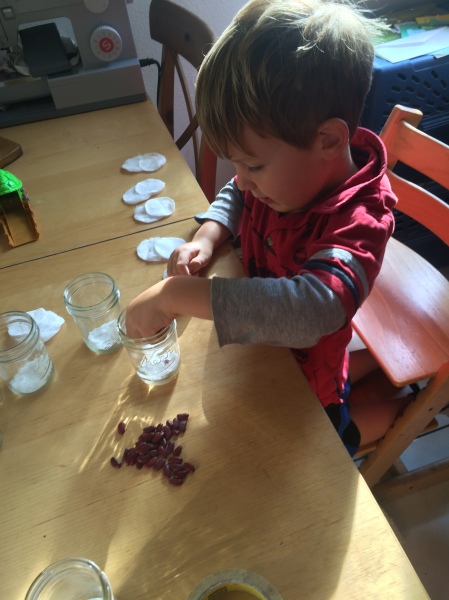Bathroom Botany
I was sitting outside, enjoying a bit of sunshine, when Zachary walked out of the bathroom and approached me with an inquisitive look. "Mom, can plants grow with pee?"
The question from my just-turned-four year old caught me off guard.
"Uh, I'm not sure."
He reasoned: "Well, pee comes from water, right? So maybe they can."
"Huh. Maybe they can." And then I realized the potential this question had.
"Hey, do you want to do an experiment? We can try to see if plants will grow if we water them with urine." His face lit up and he followed me inside.
 We hunted for some cotton, six glass jars, a handful of beans, masking tape and a Sharpie. I showed him how to separate the cotton and prepare one jar - cotton layer, three beans, and another cotton layer. Then he prepared all the rest on his own. I asked him what sounds were in the words "agua" and "pipi" (he's bilingual), and carefully wrote the words in cursive as he watched. And then, because he had just used the bathroom, I invited him to drink a big glass of water.
We hunted for some cotton, six glass jars, a handful of beans, masking tape and a Sharpie. I showed him how to separate the cotton and prepare one jar - cotton layer, three beans, and another cotton layer. Then he prepared all the rest on his own. I asked him what sounds were in the words "agua" and "pipi" (he's bilingual), and carefully wrote the words in cursive as he watched. And then, because he had just used the bathroom, I invited him to drink a big glass of water.
An hour later, we were ready to start watering! We separated the glass jars based on their labels, collected his urine, and I showed him how to use a dropper to get the same amount of liquid into each jar.
We have three jars that are being watered with tap water (our control group) and three being watered with urine. Every day, he reads the labels, separates the jars, and uses the dropper to provide equal hydration to all the beans.
It's been a week, and we're waiting with bated breath for the results of our experiment!
Apart from learning whether his hypothesis was correct or not, there's SO MUCH peripheral learning taking place with this activity! He's perfecting his use of a dropper, learning how to set up a controlled experiment, reading labels, sorting & classifying, practicing proper hygiene, developing persistence, delaying gratification, and experiencing the beauty of botany! Once our beans germinate, there will be new vocabulary, comparisons, and conclusions.
Children are natural scientists, and with a little help from us they can develop skills that will last a lifetime!
The question from my just-turned-four year old caught me off guard.
"Uh, I'm not sure."
He reasoned: "Well, pee comes from water, right? So maybe they can."
"Huh. Maybe they can." And then I realized the potential this question had.
"Hey, do you want to do an experiment? We can try to see if plants will grow if we water them with urine." His face lit up and he followed me inside.
 We hunted for some cotton, six glass jars, a handful of beans, masking tape and a Sharpie. I showed him how to separate the cotton and prepare one jar - cotton layer, three beans, and another cotton layer. Then he prepared all the rest on his own. I asked him what sounds were in the words "agua" and "pipi" (he's bilingual), and carefully wrote the words in cursive as he watched. And then, because he had just used the bathroom, I invited him to drink a big glass of water.
We hunted for some cotton, six glass jars, a handful of beans, masking tape and a Sharpie. I showed him how to separate the cotton and prepare one jar - cotton layer, three beans, and another cotton layer. Then he prepared all the rest on his own. I asked him what sounds were in the words "agua" and "pipi" (he's bilingual), and carefully wrote the words in cursive as he watched. And then, because he had just used the bathroom, I invited him to drink a big glass of water.An hour later, we were ready to start watering! We separated the glass jars based on their labels, collected his urine, and I showed him how to use a dropper to get the same amount of liquid into each jar.
We have three jars that are being watered with tap water (our control group) and three being watered with urine. Every day, he reads the labels, separates the jars, and uses the dropper to provide equal hydration to all the beans.

It's been a week, and we're waiting with bated breath for the results of our experiment!
Apart from learning whether his hypothesis was correct or not, there's SO MUCH peripheral learning taking place with this activity! He's perfecting his use of a dropper, learning how to set up a controlled experiment, reading labels, sorting & classifying, practicing proper hygiene, developing persistence, delaying gratification, and experiencing the beauty of botany! Once our beans germinate, there will be new vocabulary, comparisons, and conclusions.
Children are natural scientists, and with a little help from us they can develop skills that will last a lifetime!
“We especially need imagination in science. It is not all mathematics, nor all logic, but it is somewhat beauty and poetry.” - Dr. Maria Montessori
Categories
- 3-6 (8)
- 6-9 (26)
- 9-12 (8)
- Positive Discipline (2)
- Conscious Parenting (12)
- Montessori Curriculum (9)
- Preparation of the Adult (14)
- Preparation of the Environment (11)
- Montessori Principles (11)
- Montessori Homeschooling (20)
- Language Arts (3)
- Math (3)
- Geography (2)
- Biology (1)
- History (2)
- Practical Life (1)
- Montessori Stories (4)

3 comments
Leave a comment